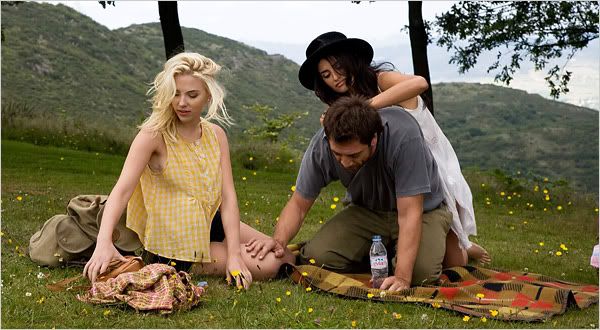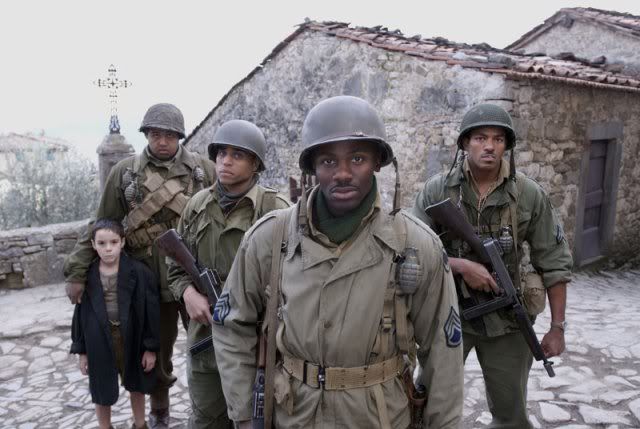While it took Hollywood nearly forty years to finally honor the talents of Martin Scorsese, the Academy recognized his talents with a Best Director Oscar for The Departed. The film, an excellent remake of the contemporary Asian crime film Infernal Affairs, worked for a couple of reasons. Despite some faint, initial outcry, the original, while very good, wasn't great. While it had a very good premise (the cops and criminals each with a mole in the other's camp), it didn't elevate beyond standard procedural tropes. In the remake, screenwriter William Monahan found a psychological core that didn't exist with the original and raised the stakes, using the premise as a launch pad to investigate the relationship between class and power. And it certainly didn't hurt that Jack Nicholson, Leonardo DiCaprio, Mark Wahlberg and Alec Baldwin were delivering the lines.
Now comes an announcement that Scorsese plans to executive produce a remake of Akira Kurosawa's classic, High And Low. As much as I love and respect Scorsese, this just smells of another attempt at Oscar gold. Teaming with producer Scott Rudin (No Country For Old Men, There Will Be Blood), director Mike Nichols (The Graduate) and screenwriter David Mamet (Glengarry Glen Ross), and no doubt enlisting an A-list cast, the project seems to be surefire bet for Oscar consideration. But where Infernal Affairs benefited from a script rework, I just can't see how Mamet can improve on the original.
The film, based on pulp novelist Ed McBain's King's Ransom concerns the kidnapping of wealthy businessman's son. As he races to get money together for the ransom, it is revealed that the criminals made a mistake, and actually kidnapped his driver's son. In addition to adding another layer of white knuckle tension, the film doubles as exacting social commentary, and Kurosawa balances everything with the deft and assured hand of a master at work. In short, the original is already thematically rich in addition to being absolutely thrilling. A remake would be nothing short of redundant; the same film dressed up in modern clothing.
Remakes in and of themselves, aren't necessarily a bad thing, and have been a Hollywood tradition since the cameras were first turned on. That said, Hollywood does have a horrible habit of remaking anything and everything without much in the way of discretion. It will be interesting to see what the end result turns about to be, but I'm not holding my breath. In the meanwhile, if you haven't seen High And Low, there is no better time than now to see it. The Criterion Collection has just re-issued the film in a fantastic two-disc set.
Thursday, October 30, 2008
Tuesday, October 28, 2008
Some Pleasant Diversions
I just wanted to take a moment to highlight some people and places that have been kind enough to drop by.
Liz Ohanesian is a freelance journalist based in Los Angeles who has written for the Santa Monica Mirror, PopMatters, Outburn and most recently wrote an excellent piece on director Charlie Kaufman and his new film Synecdoche, New York for LA Weekly. Her blog, Party Pauper, links to her work and also gives some great insight into the life of a freelance writer.
If you've checked out the comments on some of my posts, you'll find some very passionate opinions from Kim Dubuisson, the man behind Gorezone. It's a one stop shop for news and reviews from the world of horror films. He brings that same passion to his site and it's treat for genre enthusiasts.
Finally, even my Dad has gotten into the blogging phenomenon, with A Positive Focus, where he dispenses his thoughts on various topics, with a unique perspective.
Please take a few minutes and check 'em out.
Liz Ohanesian is a freelance journalist based in Los Angeles who has written for the Santa Monica Mirror, PopMatters, Outburn and most recently wrote an excellent piece on director Charlie Kaufman and his new film Synecdoche, New York for LA Weekly. Her blog, Party Pauper, links to her work and also gives some great insight into the life of a freelance writer.
If you've checked out the comments on some of my posts, you'll find some very passionate opinions from Kim Dubuisson, the man behind Gorezone. It's a one stop shop for news and reviews from the world of horror films. He brings that same passion to his site and it's treat for genre enthusiasts.
Finally, even my Dad has gotten into the blogging phenomenon, with A Positive Focus, where he dispenses his thoughts on various topics, with a unique perspective.
Please take a few minutes and check 'em out.
Sunday, October 26, 2008
Don't Worry, Be Poppy

Director Mike Leigh, best known for his emotionally wrought dramas such as Vera Drake and Secrets & Lies, takes a 180-degree turn with his latest film, Happy-Go-Lucky. An unabashed burst of sunshine, Leigh’s lead character is Poppy, a 30 year old grade school teacher with a nearly manic thirst for life. Always eager to put a smile on someone’s face or listen to a problem, Poppy floats through her days content with living the same way she did at twenty years old. Leigh finds all of this oh so charming, and hopes the audience takes Poppy’s approach to life to heart as well, finding something winning in her unrestrained good nature and take-it-as-it-comes-with-a-smile-on-your-face attitude.
Unfortunately for Leigh, Happy-Go-Lucky veers dangerously close to being a tourism trip to the lower classes to celebrate their exotic ways. Poppy and her flatmate seem to live a life that is an extended version of a slumber party, as they walk around in old PJs, hang out together in their bedrooms and order take out. Poppy is also, conveniently, a grade school teacher where her amped up happiness can only prove to be an asset. However, a major sequence in the film has Poppy, her younger sister and her roommate heading out to the suburbs to visit her older sister. Pregnant, married and living in a new house with a yard, Leigh scripts her as haughty and condescending of Poppy’s lifestyle. The notion Leigh puts forth is that it’s inconceivable of somebody in the suburbs being truly happy the way Poppy is. It’s simplistic at best and borderline offensive at worst, suggesting that even though Poppy is lower down the food the chain, her lack of responsibilities somehow grant her a magical potion for a stress-free lifestyle. Leigh doesn’t see that there is a middle ground. There are many single people and couples with “adolescent” impulses, that also manage to balance mortgages, children and savings.
In an interview with the Hour, a weekly Montreal newspaper, Leigh states that the film is about "...the way ordinary people without privileges just get on with things, or don't, as the case may be. It's an anti-miserablist film, we are destroying ourselves and each other and the planet, and there's much to be gloomy about, but there are people out there getting on with it." What Leigh seems to not understand is that "ordinary people" "get on with it" because they have to. Poppy's life as a single woman with no children and a steady job, simply isn't representative of "ordinary people" and it's a major flaw that prevents Happy-Go-Lucky from gaining any kind of insight into the true workings of the lower or middle class. If Leigh had chosen a single mother, or a family with both parents working and raising children, it would've been a truer representation of what so-called "ordinary people" do to "get on with it". But he plays it safe and familiar, giving the audience a digestible, quirky British girl to tell them to smile and be happy with their lot. Which, to put it in British terms, is a whole lot of rot.
Thursday, October 23, 2008
Woody's Barcelona

For the better part of three decades, Woody Allen has been New York City’s unofficial biographer, capturing with a lover’s eye, that magical city's elusive allure as he wound his characters through the streets that never sleep. Who can forget the brilliant series of black and white still shots that open Manhattan; the architecture tour in Hannah & Her Sisters or the numerous apartments, theaters and parks that tracked a relationship in Annie Hall. It seemed impossible to think of Woody Allen even considering shooting in another city. But while European audiences continued to support Allen, the quintessentially American filmmaker couldn’t seem to find an audience at home, and in 2005 Allen crossed the Atlantic where funding and support were more readily available.
Match Point, Allen’s triumphant return to critical acclaim, marked the first of three films shot in England. While both Match Point and Cassandra’s Dream were exercises in morality, and Scoop a nostalgic take on classic comedy tropes, Vicky Cristina Barcelona vaults itself over any genre specifications and into the canon of Allen’s finest accomplishments. Moreover, it finds Allen training his camera with the same lingering sense of longing and beauty that he would in New York City, on the landmarks of Barcelona and provincial Spain.
Needless to say, I’ve been looking forward to this film all year, but even I could not have anticipated what an accomplishment Vicky Cristina Barcelona is. On the surface, the traditional Allen themes of romanticism versus pragmatism, art versus commerce and the sources of artistic inspiration are all to be found here. But what unfolds is something richer that taps deep into the well of the sacrifices that are made for passion and comfort, wrapped in a remarkable package that is by turns hilarious and sober.
Best friends Vicky (Rebecca Hall) and Cristina (Scarlett Johannson) are on vacation in Barcelona. Vicky is due to marry her thoroughly bland fiancee Doug upon her return to New York City, while Cristina is simply drifting, caught in a state of post-graduation uncertainty. One night at dinner, they are very openly propositioned by Juan Antonio (Javier Bardem), an artist who suggests they all spend the weekend together in the country, take in the sights, have some good food and of course, sleep together. The buttoned down Vicky is appalled, while Cristina is intrigued. They end up deciding to go with Juan Antonio, but with no guarantee of sex. Of course, both girls end up falling for Juan Antonio and from there, without spoiling the film for anyone, the wheels are put in motion for a very interesting summer.
Allen seems to have relished his time in Bareclona and Spain, as he scatters the film with shots of Gaudi’s famous buildings, the colorful alleyways of metropolitan Barcelona, and with a honey glazed lens, finds the soul of rural Spain, with simple shots of storefronts and quiet landmarks that left my fellow audience members literally gasping. But beneath these shots, and just visible under the dual love triangles that make up the film, is a very sophisticated script that offers up a progressive view of artistic relationships (both romantic and professional), that considers what each person brings into a situation, and makes quiet argument that sometimes multiple partners are needed to maintain the balance of sexual, artistic and emotional needs. It’s an intriguing logic, and certainly very “European”, but it’s all the more remarkable in that it’s coming from a man who is at an age when most directors and writers have long retired. It’s inspiring to find a director who is still working out new angles on familiar themes, with the intelligence many in the industry half his age simply lack.
Vicky Cristina Barcelona was more than worth the wait, and it ranks with Allen’s finest films. Funny and heartwarming, it’s a wonderful journey that doesn’t offer simple solutions for the lives of artists, but humbly suggests, without judgment, that the paths chosen are the ones best for the individual (or individuals) involved.
Labels:
Comedy,
Drama,
Javier Bardem,
Penelope Cruz,
Romance,
Scarlett Johansson,
Woody Allen
Friday, October 17, 2008
Clint Eastwood 1, Spike Lee 0

This summer, Spike Lee and Clint Eastwood got into a very public war of words, when Lee attacked Eastwood for not giving enough representation to African-American soldiers in his duo of WWII films, Flags Of Our Fathers and Letters From Iwo Jima. Lee made the comments at the Cannes film festival, where he just happened to be showcasing an eight minute reel of his own WWII epic, Miracle At St. Anna. While I understood Lee's point, his actions played out as nothing more than some bait to throw journalists to give free promotion to his upcoming film. As for Eastwood, his reaction was just as juvenile, and I frankly thought his WWII films were a pedestrian endeavor at best. All that said, I hoped that Lee would back up his vitriol with a film that would finally bring a real African-American perspective to WWII.
He didn't.
Miracle At St. Anna is a qualified trainwreck that conversely has too much and too little within its overly long two hour and forty minute running time. What is in excess is plot, with James McBride's script (adapted from his own novel) overflowing with multiple, meandering plot lines that often stall and stutter, instead of advancing the story. Thus, its all the more vexing that every character in the film - the quartet of black soldiers; German soliders; Italian citizens and even Americans back home - never develop beyond one dimensional characters. It's hard to believe that the same man who made the wonderfully furious and complex Do The Right Thing is responsible for the run of baby killing Germans, gesticulating Italians, backward hillbillies and ignorant American Army brass that populate the film. McBride and Lee even have the audacity of tossing in a "magical negro", an archetype which Lee himself so famously derided, into one of the lead roles.
As I waited with growing impatience for the film to end, wondering why John Leguizamo, John Turturro and Joseph Gordon-Levitt all signed up for roles that were essentially nothing more than (wasted) cameos, it was Derek Luke's magnetic performance that kept me invested in the film. And the photo still above starts one of the most powerful shots/sequences in the film, that ranks right up there with Lee's most memorable scenes, and it still gave me hope that Lee had something up his sleeve for the ending.
But it wasn't to be.
McBride's script closes the film with a conclusion so pat and sweet, you may need to see the dentist, and then as if to up the unbelievability factor, Lee treats the audience to "He's Got The Whole World In His Hands" over the end credits. Lee's film is so bad that comparing it Eastwood's film - or any other WWII film for that matter - is just embarrassing.
Spike Lee hasn't lost his passion, but with Miracle At St. Anna, he lost his focus. With the film unfolding in a few different directions - WWII epic, revenge film and fantasy film - it never gels into a cohesive whole. His indictment of the treatment of African-American soldiers simply gets lost in the mechanics of a preposterous, overly complicated story. I'm still rooting for Spike Lee but he needs to get back to the kind of lean, effective filmmaking that made Do The Right Thing, Clockers, Get On The Bus, 25th Hour and Inside Man so invigorating and powerful.
Subscribe to:
Comments (Atom)


